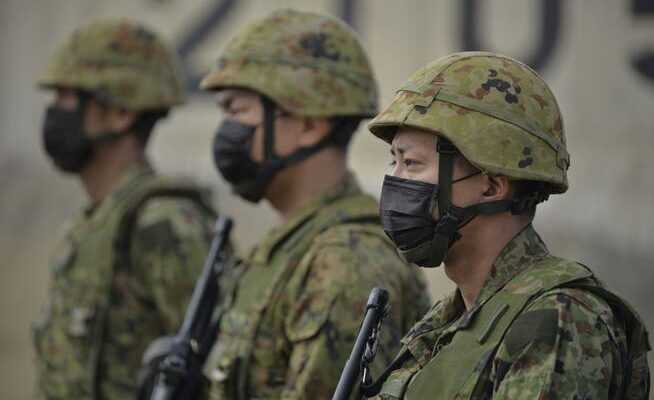Japan’s defense minister speaks of a “dramatic” increase in military spending. This is a clear sign of a turning point in security policy in Asia.
Japan calls its army “Self-Defense Forces” – the constitution states that Japan must not have any war potential. Is this reticence changing now?
Earlier this week, Japan’s Defense Minister Nobuo Kishi said he would request a “dramatic” increase in the defense budget for 2023 to counter China’s expansion efforts and North Korea’s nuclear weapons program. Kishi stated that the long-term goal is to catch up with the German government’s turnaround in armaments, which, in view of the Russian invasion, is increasing spending on the military to two percent of gross domestic product faster than planned. “Our country must also think about a similar step,” said Kishi. This would correspond to a doubling of Japan’s arms budget.
Kishi did not name specific budget targets or a time frame. But his demand underscores the extent to which the Ukraine war is accelerating an armament spiral between China and other countries in Asia as well. South Korea, an ally of the United States, has been increasing its military budget faster than Japan, America’s most important ally in the region, for years.
Taiwan is also discussing extending conscription, increasing missile production and weapons from the US to deter China from invading. Australia is bringing forward purchases of fighter jets and missiles by three years to 2024. The country signed a military alliance with the United States and Great Britain last year.
It is about increasing the deterrence of potential adversaries, Australian Defense Minister Peter Dutton told the Seven Network TV channel this week. Until now, it was assumed that a Chinese attack on Taiwan could take place in the 2040s. “I think that timeframe has now dramatically shortened.”
Japan becomes a symbol for the armament spiral in Asia
The fact that even Japan is threatening to give up its military restraint is the clearest sign of a turning point in security policy in Asia. After all, the former colonial power, in contrast to fellow war losers Germany, has not carried out any combat missions since the Second World War.
What’s more, Japan’s constitution forbids the country’s potential for war. This is a lesson learned from the Japanese conquest, which lasted from the late 19th century to the end of World War II. Japan rearmed after the Second World War and founded the “Self-Defense Forces”. For decades, Japan stuck to its self-imposed rule of spending no more than 1 percent of gross domestic product on defense so as not to frighten its neighbors.
The current government has already given up the previous cap. Concerns about China’s buildup are growing as its neighbor increasingly aggressively stakes its claims on the Japanese-controlled rocky islands and threatens to take Taiwan militarily.
But Japanese Prime Minister Fumio Kishida only increased the defense budget for the current year by 1.1 percent to 5.4 trillion yen (40 billion euros). Depending on the exchange rate, Japan has the seventh to ninth largest defense budget in the world.
The fear of the return of empires
That’s not enough for former top Japanese diplomat Kunihiko Miyake, director of the Canon Institute for Global Studies (CIGS). “Tokyo is waking up now, but not as much as Germany.” Japan’s situation is much more risky for him. Miyake expects less of a conflict between democracies and dictatorships. “It’s much more complicated,” Miyake said at a CIGS webinar this week, “the rivalry between the former empires of the United States, Russia, China, Turkey and perhaps Iran will return.”
This means that the challenge in East Asia is greater than in Europe, says Miyake. Germany only has one imperial power to worry about, while Japan has two neighboring powers: China to the west and south, and Russia, which controls two Japanese-claimed Kuril Islands, to the north.
Defense Minister Kishi, as a security policy hardliner, is therefore trying to determine the discussion about the new budget at an early stage. And not without reason: In view of the high national debt and the globally rising interest rates, the distribution battle is intensifying. The government must also finance the rapidly growing army of pensioners with a shrinking population, securing the supply chains, an energy transition and climate protection. The double price surge caused by the Corona crisis and the Ukraine war also calls for further economic stimulus.
But the debate about rebalancing Japan’s security strategy has begun. And the conservative wing of the ruling Liberal Democratic Party is trying to set the tone. The acquisition of weapon systems with which Japan can attack enemy military bases is on the agenda anyway. In addition, Kishi’s brother, former Prime Minister Shinzo Abe, has already brought up military support for Taiwan and the stationing of American nuclear weapons in Japan.
